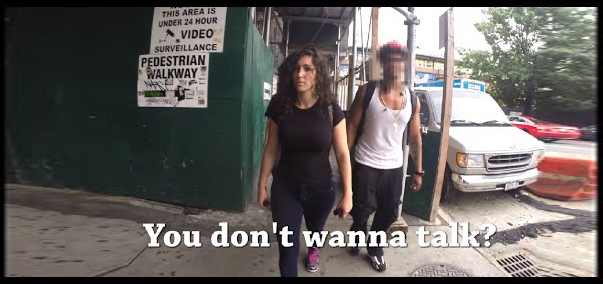
Was I in danger? No.
Did he touch me? No.
Did he break the law? No.
Did I get in my car shortly thereafter and return to my hotel? Yes.
He spooked me. It was genuine fear of being out and about and somehow opening myself up to another reaction like that. I can’t explain why he was different than the others who have done and said similar things to me over the years, but something made me flee. I wondered if I’d done something to invite it. Since then I’ve encountered plenty of comments on the street that range from subtle to overt; some make me smile and others make my skin crawl.
That Arizona incident has come back to me this week because of the cat calling video that has gone viral and the ensuing commentary. The way I see it, if one guy watches that video and rethinks how he approaches women, it was worth all the dismissal and charges of overreaction that have also come in response. Most of us know what it feels like to have a casual utterance made to us on the street and laugh about it or even be flattered by it vs. the slimy ones that make us feel like we need a bath.
Some of the comments I’ve read from men who were appalled at the video were heartening. This really made them understand. It’s also been interesting to read the reactions from women who take issue with other women who don’t see this as a compliment. We’re not all going to feel the same way about this – why do we have to put down others who find this behavior scary or intrusive? Maybe we can listen to each other more, yes?
The idea of story has become a cliché these days, but I think that’s for good reason. Story is powerful.
In the last month, sparked by the stories of affirmative consent discussions taking place at colleges, there is another incident from my past that has come back into my consciousness. I was in my 20s and enjoying time with friends at Club Med in Cancun. I partied pretty good (I’m a lightweight, so all that required was a few drinks with umbrellas in them) and we were dancing into the wee hours. A guy began flirting and he seemed fun and funny so I flirted back. He suggested a walk on the beach.
Kissing escalated and before I knew it I was pinned to the sand. I recall being tipsy and laughingly telling him to stop. Then I began trying to push him off of me. By then his hand was under my dress and he was pulling my underwear aside and trying to get in there. I eventually flailed my way out of the situation. I don’t remember being scared or in danger. But in retrospect, I am convinced one more drink and I would have had no say at all in what transpired.
I don’t have residual trauma from either of these incidents. I’m not holding them up as evidence that all of these situations are black and white. They’re clearly not. Consent lines can certainly be blurry. One woman’s compliment is another’s fear trigger.
But given what we see happening in hazing situations, where young men are violated by other young men, and who-knows-what kind of modeling going on in their homes, isn’t it a good idea to shine some light on how wrong this unwanted behavior can be? Isn’t it important to hear stories of how it’s received?
Also, to be clear, I don’t mean to lump in street harassment with sexual misconduct. It’s simply that current events sometimes make us feel like, “Oh, that’s happening to someone else. It’s not my problem.” In reality, most women can relate stories like this from their past. Maybe it’s time we shared more. Perhaps that’s what prompted me to put these to paper. I think it’s powerful that Texas state senator Wendy Davis wrote in her memoir about having two abortions for medical reasons and that we’ve gotten real about the fact that the majority of them don’t take place in situations of rape/incest. Taking it another step, writer Merritt Tierce shared her own abortion story “unlikely to generate much sympathy” in The New York Times.
Sometimes staying quiet feels like we’re throwing our sisters to the wolves.
When Monica Lewinsky surfaced on Twitter recently with the hashtag #HereWeGo and was lambasted for her infidelity, all I could think of was my own past dalliance with a married man and the amount of people I know who have had affairs. It happens. She was young. She fell in love with a powerful man, her boss. First time that’s ever happened? I don’t think so.
Our stories — including our mistakes, our scares, our scars – make us who we are. People who feel they’ve done something to deserve being violated tend to also feel alone in the world. The woman in the video is not the only woman to find cat calls disturbing rather than flattering. Women who have had abortions because it isn’t the right time in their lives to take on the responsibility of a child are not an anomaly. Affairs happen.
These are all the things that make us who we are. A few years ago when I shared parts of my life that I thought might give a man I was dating pause, it was a priceless feeling to have him open up to me even more. It was a game changer in the relationship.
There’s something afoot in our speaking out, in young women insisting on being heard, on victims being brave, on airing our indiscretions. Our truth is going from whisper to roar.
We’re real. Flesh-and-blood real. Lots of men love us for it. Those are the gems. Maybe by being vocal we’ll give a few more the inspiration and education to be gems, too.
This is what feminism looks like.







Excellent writing as always, Nancy. I’ve shared this article with my 18 year old daughter who is in college. Thank you for it.
Chris, I’m so happy you shared this with your daughter. Makes me feel like the piece has already done its job.